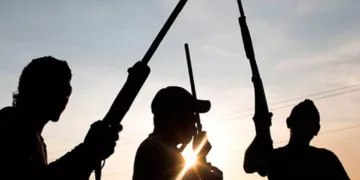Nigeria teeters on the brink, its social fabric strained by the relentless crises of poverty and insecurity. Recent events have cast a stark light on this emergency: an ambush in Zamfara State on August 1, 2025, killed 10 villagers, as reported by local authorities, while the National Bureau of Statistics (NBS) revised poverty estimates on August 3, 2025, revealing that 55 per cent of Nigerians—over 113 million people—live below the poverty line.
Médecins Sans Frontières reported an additional 150 child deaths from malnutrition in Katsina since July, pushing the 2025 total to 802. These tragedies, amplified by public outrage on social media, signal a nation in distress.
The human toll of Nigeria’s dual crises has escalated. The Zamfara ambush targeted a farming community, leaving families devastated and reinforcing the pervasive fear of banditry. In Borno State, ongoing Boko Haram attacks have displaced an additional 15,000 people in July 2025, according to the United Nations (UN) estimates, bringing the total number of internally displaced persons (IDPs) to over 3.2 million. Katsina’s malnutrition crisis, with 802 child deaths in 2025, reflects the dire consequences of displacement, compounded by a 30 per cent funding cut from international donors since June, as Médecins Sans Frontières noted. On July 29, 2025, the Big Tent coalition warned of Nigeria’s potential collapse under poverty, insecurity, and elite failure, a prognosis echoed by social media posts decrying government neglect amid elite extravagance. These examples paint a picture of systemic breakdown demanding immediate intervention.
The nexus of poverty and insecurity remains a vicious cycle, rooted in structural failures. Economic mismanagement, exacerbated by the 2024 global oil price slump and lingering COVID-19 effects, has slashed government budgets, with inflation rising to 36.2 per cent in July 2025, according to the Central Bank of Nigeria (CBN).
Corruption siphons resources, leaving wealth concentrated among a few while millions struggle, as the Big Tent coalition highlighted. Insecurity, driven by terrorism, banditry, and communal clashes, displaces communities, halting agriculture and deepening economic despair. Climate-induced resource conflicts, particularly in the Middle Belt, displace thousands, with herder-farmer disputes intensifying in July 2025. This cycle, unchecked, threatens Nigeria’s cohesion.
The government’s response, while visible, remains inadequate. Military operations, such as those in Zamfara reported on August 2, 2025, yield sporadic successes, yet the August 1 ambush exposes persistent vulnerabilities. The National Emergency Management Agency (NEMA) has deployed aid to IDP camps, but recent protests in Borno on August 4, 2025, over diverted supplies highlight ongoing mismanagement. The establishment’s narrative of progress—emphasising troop deployments and social investment programmes—lacks substance when 113 million remain impoverished and violence persists.
Economic initiatives, like the National Social Investment Programme (NSIP), aim to alleviate poverty but are plagued by inefficiencies. August 2025 audits revealed 20 per cent of funds unaccounted for, echoing 2024 findings of ghost beneficiaries. Agricultural subsidies, intended to boost food security, often fail to reach farmers, as social media complaints noted.
The government’s declaration of a malnutrition emergency in Katsina, reiterated on August 3, lacks follow-through. International aid organisations step in despite funding gaps. This reactive stance, prioritising short-term optics over long-term solutions, fails to break the cycle.
To its credit, the government increased security budgets by 15 per cent in 2025 and sought regional partnerships, but these efforts are undermined by corruption and a lack of coordination. The establishment’s focus on incremental gains ignores the urgent need for systemic overhaul, risking further public disillusionment.
This newspaper proposes a robust, multi-faceted strategy to address these crises. Economically, the government must invest in education, healthcare, and rural infrastructure, targeting poverty hotspots. Job creation programmes can reduce desperation and curb recruitment into criminal groups, especially for youth. Transparent cash transfer schemes, scaled up with independent audits, can ensure aid reaches the needy. The National Assembly should mandate quarterly poverty reduction reports to enhance accountability.
On security, a holistic approach is vital, blending military action with community engagement. Supporting local peace committees and providing vocational training can deter violence. Strengthening border security and collaborating with ECOWAS can curb arms flows. To craft a sustainable framework, the government should convene a national security summit by September 2025, involving community leaders and civil society.
International cooperation remains key. Nigeria must renew donor funding for humanitarian aid and seek technical support for security reforms. Regional partnerships can address cross-border threats, ensuring a coordinated response.
The intertwined crises of poverty and insecurity, now worsened by the Zamfara ambush and rising malnutrition deaths, threaten Nigeria’s future. Decisive action is imperative with 113 million in poverty and 3.2 million displaced.
We are steadfast in our mission to promote governance, human rights, and societal progress, calls on the government, legislature, and global partners to break this cycle. Nigeria can transform despair into opportunity through inclusive policies, transparent governance, and comprehensive security measures.





